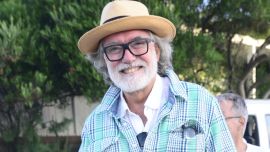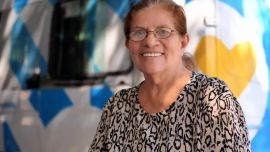An Argentine convicted in Spain of multiple crimes against humanity committed during Argentina's brutal 1976-1983 military dictatorship, is living in semi-freedom in Spain, according to reports.
Adolfo Francisco Scilingo Manzorro, today aged 73, is benefitting from penal regulations that allow him to live in a "social integration centre" where he has to return to each night.
He was once known as the first Argentine human rights violator from the dictatorship-era to be sentenced abroad for his crimes, having been tried under Spain's universal jurisdiction laws. Originally from Bahía Blanca, Scilingo was arrested in 1997 in Spain after admitting to Judge Baltasar Garzón that he had taken part in two "death flights" – trips in which victims were thrown from planes or helicopters into the Río de la Plata.
Death flights were one of the the many forms of extrajudicial and summary executions operated by the junta during the last military dictatorship (1976-1983).
In 2005, Scilingo was originally sentenced to 640 years in prison for crimes against humanity, including the "causing [of] 30 deaths." The sentence was increased in 2007 to 1,084 years, when he was found guilty of acting as an accomplice to 255 crimes of illegal detention. However, in the same ruling, Spain's Supreme Court also limited the maximum effective sentence to 25 years.
According to reports, Scilingo is now a beneficiary of Article 100.2 of the rules governing Spain's prison. Under the regulations, he is allowed him to serve out the remainder of his sentence outside prison, similar to house arrest.
According to the AFP news agency, which cited a source close to prison officials, Scilingo was released from the Madrid prison where he was serving his sentence in November and has been transferred "to a social integration centre, which is still a prison for people in a semi-freedom regime."
He sleeps there every night and goes out every day, from Monday to Saturday, to help out at a soup kitchen in Madrid. In this way, he "continues to serve his sentence," the source added.
According to the same source, Scilingo could be set free by 2022, although it will be up to a judge to decide when the time comes.
"As the sentence progresses, the objective is reinsertion. He has very little time left to serve his sentence, he had been in prison for many years, and we had to find a way out so that he could be reintegrated into society," added another source close to penal officials.
The news generated anger among human rights organisations. Speaking to a local radio outlet, Graciela Lois from the Relatives of the Disappeared and Detained for Political Reasons NGO said: "I knew that Scilingo was asking for freedom. I talked about it about a year ago with my lawyer. My lawsuit is still going on.”
"My lawyer told me that you can't appeal penal law. I would like to make it clear that my lawyer is very well known in Spain and is the one who is doing all this trial and is very respectful of the rights issue," she told the El Destape radio station.
The former lieutenant commander, who graduated from the Naval Academy in the 1970s with the rank of midshipman, served during the dictatorship at the infamous ex-ESMA Navy Mechanics School in Nuñez, which was used by the junta as a clandestine detention centre.
In total, Scilingo spent 22 years, one month and 10 days in prison, AFP reported.
Scilingo retired aged 40 in 1986. Almost 10 years later he admitted that he had participated in human rights violations in an interview with journalist Horacio Verbitsky. He also provided details of the babies born in captivity that were appropriated and kidnapped by the military.
– TIMES/PERFIL/AFP


















Comments